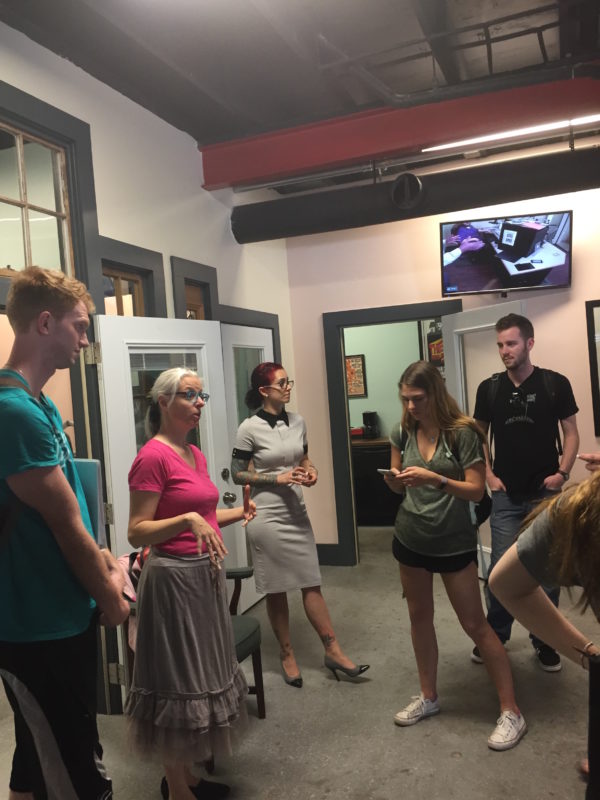Radio can serve as a tool to affect political change. Just ask activists working at WHIV, New Orleans’ own Low Power FM station.
102.3 WHIV differs from mainstream media in both its organization and content. As an LPFM, it serves the public interest by presenting diverse opinions that are not produced in commercial broadcasting.
WHIV was born from the surge of protests in reaction to the lack of diverse content on mainstream radio after the passage of the 1996 Telecommunications Act. The Act led to an unprecedented consolidation of station ownership. Nonprofit activists, such as Prometheus pushed for better policy until the Radio Broadcasting Act in 2000 created LPFM radio stations nationwide. LPFMs stations broadcast with under-100 watts of power. Prometheus would go on to help establish WHIV.
WHIV and other LPFMs have a small transmission radius but a large impact.
Media scholar Jonathan Hardy defines LPFMs like WHIV as alternative media in that they “challenge central concentrations of [mainstream] media resources.” The alternative airwaves are reserved for groups such as non-profits, religious groups, Native American organizations and local municipalities.
WHIV features diverse programming including talk shows with hosts from the LGBTQ and Muslim communities of New Orleans, each addressing issues specific to their community. The LPFM also accounts for diversity in its music programming, allowing for disc jockeys such as Carey Lynn to broadcast music created on the Gypsy Road in the Middle East.
LPFMs are run by a community and for that community.
Hardy argues that alternative media and specifically the “community or citizens media, [like LPFM] are valued as “media serving, often empowering, minority social or ethnic groups and interests in geographic or geo-cultural communities.” Part of this empowerment comes from the idea that alternative media is often based on citizen participation.
WHIV is run by a group of volunteers made up of approximately 60 radio hosts and six members who serve as the Board of Directors. The volunteers are all citizen activists in New Orleans that come from diverse backgrounds who through the station are able to support the communities they belong to. WHIV successfully serves them by providing a creative outlet from them to create awareness and create change.

This photograph was taken during a trip to WHIV with my Tulane University Media Analysis course taught by Professor Vicki Mayer. We had the opportunity to tour the station and learn about its history from Liana Eliot, one of the co-founders of WHIV. Photo by Michele Friedstadt.
Citizens use LPFMS for the promotion of localism: the coverage and support of local culture, news, events and affairs. Full power radio stations, owned by large media conglomerates whose interests are far removed from the community a particular station serves, fail to provide localism. LPFMs are therefore the tool for localism and in that sense contests mainstream media. Lastly, LPFMS contest media through their format of being non-commercialized. They do not prioritize their content based on outside organizations such as advertisers because there is no advertiser funding or influences
WHIV’s music and talk programs alike promote local community music, news and events, connecting the interests of all members of the community to one outlet. This station serves a significant role for New Orleans by keeping the local public interest as a priority; something that mainstream radio in New Orleans and across the U.S. fails to do.
Finally, LPFMs promote social justice. In “Making Old Technology Anew,” author Christina Dunbar-Hester highlights that the activists for LPFMs “specifically emphasized radio’s significance for political organizing, for the promotion of ‘localism,’ and for small-scale noncommercial use. Political organizing means giving “voice to oppositional politics and cultures.”
WHIV is social justice radio in its efforts to provide itself as a platform dedicated to human rights and sharing the narrative of overlooked communities in New Orleans to share their narratives. Dr. MarkAlain Dery, the station’s founder, has dedicated his life to treating and supporting victims of HIV. The stigma attached to AIDS/HIV, as well as the overwhelming rates of people diagnosed in New Orleans motivated him to create the station. Concerned about the “vulnerable Americans who live at this intersection of social inequities,” and passionate about positively impacting his community, Dr. Dery created WHIV with the goal to raise awareness about HIV/AIDS and other public health issues that pose a risk to those communities. Liana Eliot, Dr. Dery’s wife who is also a co-founder and on the board of directors for the station, explained that the station’s call letters were chosen in order to de-stigmatize HIV/AIDS, to create open and honest discussion about it, and to encourage testing and treatment.
 NOLAbeings
Multimedia artist Claire Bangser created NOLAbeings as a portrait-based story project that marries...
NOLAbeings
Multimedia artist Claire Bangser created NOLAbeings as a portrait-based story project that marries...
 Data corner: Adobe Suite (create a PDF, social media graphic, presentation, edit a photo and video
Data corner is where you go to work with analytics and top tech skills. It takes on everything from PERL and SQL to Canva and Sprout Social.
Data corner: Adobe Suite (create a PDF, social media graphic, presentation, edit a photo and video
Data corner is where you go to work with analytics and top tech skills. It takes on everything from PERL and SQL to Canva and Sprout Social.
